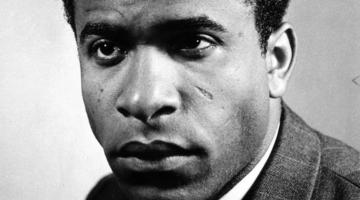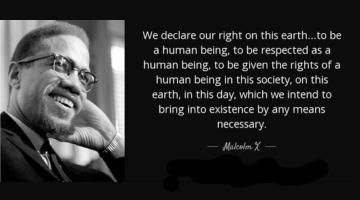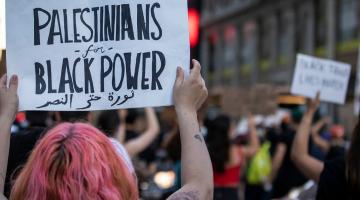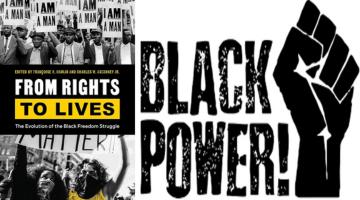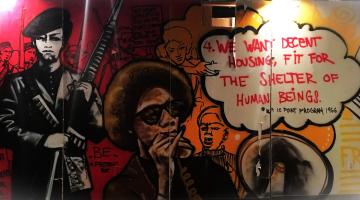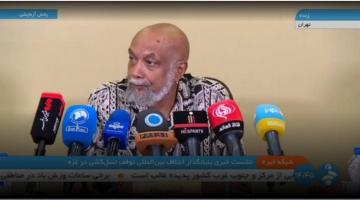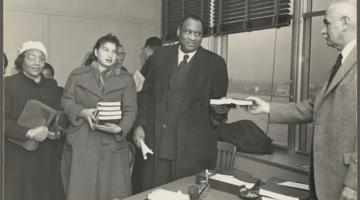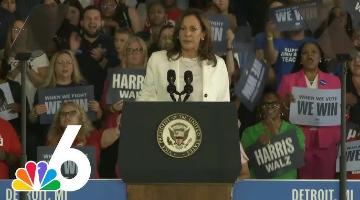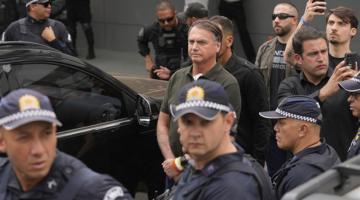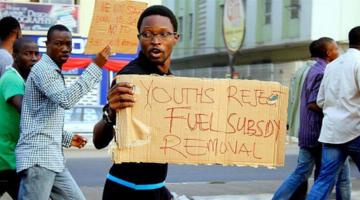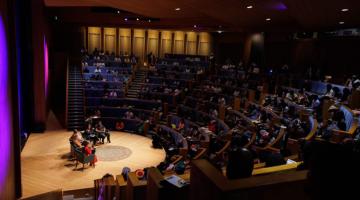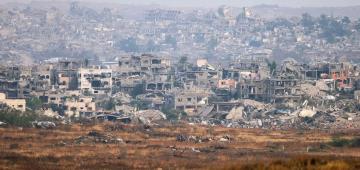Internationalism is the path toward Black liberation. Black people must resist the push to silo our movements and move in this spirit of Rosa Parks - with fearless integrity.
“I have learned over the years that when one’s mind is made up, this diminishes fear; knowing what must be done does away with fear.”[1] Rosa Parks' fearlessness against racial injustice, and her desire to be remembered as "a person who wanted to be free," is part of a long radical tradition of struggle for Black freedom. Before her deliberate act of civil disobedience on that chilly Thursday in Montgomery, Alabama on December 1, 1955, Parks’ arc of activism was extensive and extraordinary. Her Marcus Garveyite grandfather, Sylvester Edwards, taught Parks to fear no one. In 1932, she and her husband, Raymond Parks, hosted clandestine meetings at their home to map out strategies to defend the Scottsboro Boys. In 1944, after Recy Taylor was kidnapped and brutally raped by six white men in Abbeville, Alabama, Parks was the NAACP investigator sent to the scene, transcribing Taylor’s account of the brutal attack. Parks was soon ordered to leave Abbeville by Sheriff Deputy Lewey Corbitt, or face incarceration. Over the years, Parks would investigate numerous violent attacks against Black people, many of them sexual in nature, at the hands of white supremacists. The Parkses also hosted underground Voters League meetings where they encouraged Black Montgomery to challenge Alabama’s practice of denying Black people the right to vote. After “failing” the literacy test twice, Parks vowed to bring legal action against the voter registration board if she was denied a third time. Sitting for the test that third time, Parks prevailed in 1945.
Rosa Parks feared no one, as she understood what it meant to talk with her feet, and pen, in the cause of social justice. We stand on the back of the Black radical tradition in summoning Rosa Parks’ fearlessness in stating: we unapologetically refuse to embrace the argument that recognizing Palestinian humanity and suffering is antisemitism. Antisemitism is hatred of Jewish people. Anti-zionism is opposing the settler colonial project of the state of Israel. Settler colonial projects are rooted in genocide and genocide is what is happening as we write. And yet, the gut wrenching humanitarian crisis and disproportionate loss of life to Palestinians the world is currently witnessing in Gaza is aligned with the long arc of antiblackness that has altered Black lives and the formation of families spanning centuries and the globe. Of any other group, it is Black people, deracinated, thrown overboard, owned, raped, and exploited who are well-positioned to place the Zionist settler state in its place within the history of colonialism. Since Black suffering apparently escapes conceptualization for far too many, we remind our readers of the regime of terror in the belly of the cargo: “. . .the enslaved were ‘tied to heavy stones’ to prevent escape, loaded on top of each other, some ‘killed to feed others with their flesh’.” “No place on earth (…) concentrated so much misery as the hold of a slave-ship.”[2] Therefore, we do not ‘just’ bear witness to genocide. Our bodies have been testing grounds for its conception and upgrades in the current global plantation. Black flesh has been ground zero for dehumanizing acts on this earth for centuries. Attention to these antiblack threads of history that bind the oppression of marginalized groups must inform activism to attend to and answer the present call from Gaza, as Dr. King attended the call to stand with the victims of the Vietnam War and the Black Panther Party for Self Defense stood in solidarity with anticolonial struggles in South Africa and Palestine before what we are bearing witness to today.
Black internationalism is not a metaphor! In fact, intensified antiblack violence is a statement on Black refusal to bend to fear. The silencing of oppositional voices to Zionism on campuses around the country—including our own—reminds us of the move to silence Black people in the face of white supremacy during and after enslavement in the Americas. These silencing strategies included public beatings and executions as in the pelourinho of Salvador/Bahia, the killing of a beloved priest in Alabama, the COINTELPRO targeted assassination of Black Panther members in Oakland, and the disappearance of Black activists in the pacific region of Colombia. In different scales and intensities, and carried out by a white(ned) collective mastery claiming control of Black and black(ened) lives, these tactics of silencing are ever-expanding. As Black scholars we embrace our contradictions of writing from a university complicit with the settler colonial project while conscious of the (self-)censoring threats to the obligation that the Black radical tradition demands in our teaching, service and organizing at the university and beyond. As Audre Lorde reminds us: “I have a duty to speak the truth as I see it and to share not just my triumphs, not just the things that felt good, but the pain, the intense, often unmitigating pain.”[3].
In the spirit of Rosa Parks, we, too, here, are talking with our feet and our pen grounded in history. As CLR James reminds us, since “violence and ferocity were the rule of the game within the plantation, violence and ferocity survive.”[4] Black radical solidarity with Palestine is borne out of both our ‘fleshy memory’ of colonial terror, our rage with renewed assaults on our bodies and our critique of the selective activism that divides the world into zones of disposable and always-already-disposed lives. Such an inexcusable selectivity includes silence on the long-running conflict in Congo (six million lives lost and six million civilians displaced)[5], the US/AFRICOM wars of aggression in Somalia (282 airstrikes, unknown numbers of victims within the last seventeen years),[6] not to mention the daily drowning of North African immigrants left to die in the highwater of the Mediterranean sea (as of today, 29,098 deaths since the current ‘crisis’ began in 2014),[7] or the slow-motion genocide of Black people in Haiti and Brazil.
While we refuse to be dictated the terms of Black organizing, we also call out the disheartening, despairing, and dystopian present moment that renders far too many (Black) leadership across the country silent— if not fearful of repercussions that conjure up memories of tactics employed to impede Black activism during the eras of slavery, reconstruction, post-reconstruction, and Jim Crow-Civil Rights—in voicing against the live-streamed genocide of the day. We stand with and for the spirit of Rosa Parks in insisting that it is Blackness, as an insurgent praxis of freedom, that has the potential to de-territorialize empathy as we teach for abolition, tune our curriculum to the urgency of now, and join campus and global voices for an immediate ceasefire! Sitting on our fear without standing against the loss of Palestinian life and livelihood is simply antithetical to Blackness, if one understands Blackness as “being in the hold,”[8] that is, being in a permanent condition of captivity and in a permanent state of rebellion. Like our foremother Rosa Parks, we refuse to sit on fear and stand in silence because we are adamant in our Black-centered commitment to humanity. It is a commitment that envisions a geography of freedom beyond geopolitical dictates and beyond Humanity itself. Free Palestine!
______________________________________________
[1] Rosa Parks Memorial. https://rosaparksfacts.com/rosa-parks-quotes/
[2] C.L.R James. The Black Jacobins: Toussaint L’Overture and the San Domingo Revolution. pp. 8-9 (Vintage Books, 1963)
[3] https://www.poetryfoundation.org/poets/audre-lorde
[4] C.L.R James. The Black Jacobins: Toussaint L’Overture and the San Domingo Revolution. pp. 7 (Vintage Books, 1963)
[5] The New York Times, https://www.nytimes.com/2023/12/17/world/africa/democratic-republic-of-congo-elections.html
[6] The Intercept, https://theintercept.com/2023/11/12/somalia-drone-strike-civilian-deaths/
[7] Missing Migrants Project. https://missingmigrants.iom.int/region/mediterranean
[8] Christina Sharpe. In the Wake: On blackness and being. Duke University Press, 2016.
Ingrid Banks is an Associate Professor of Black Studies at University of California Santa Barbara.
Jaime Alves is an Associate Professor of Black Studies at University of California Santa Barbara.

